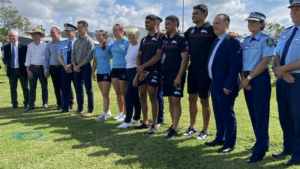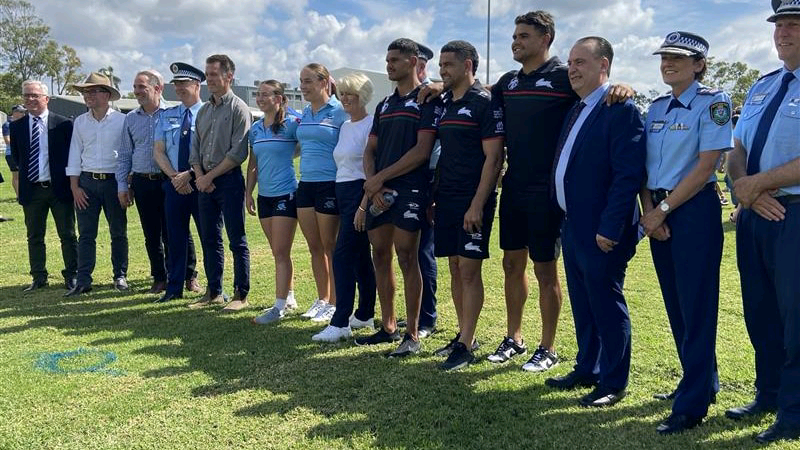An analyst has reservations about NRL stars collaborating with the NSW government on a program aimed at addressing youth criminality in Moree.
A new initiative aimed at keeping kids on the straight and narrow was announced by the Premier of NSW while on a plane to a crime-ridden remote town, just weeks after new bail regulations were implemented that make it more difficult for some young people to secure bail.
Chris Minns launched Project Pathfinder, surrounded by rugby league stars like Latrell Mitchell and Cody Walker. The program will provide at-risk teenagers with one-on-one mentorships with NRL players, sports clinics, and visits to Sydney to attend games and training.
“We know we need a major intervention, but initiatives like this offer hope and an alternative,” said Minns.
“What you cannot see, you cannot be. Furthermore, young people in Moree, in particular, may see what is achievable for them if they witness an NRL player at the top of their game.”
The program has so far been completed by three youths from Moree, Lightning Ridge, and Bourke, and the government says it intends to add more teenagers each month.
However, the program’s target youth population cannot be disclosed, and youth who have previously committed crimes are ineligible.
Children with criminal records are not eligible
Gavin Wood, the assistant commissioner, has supported that choice.
“We don’t observe children who are actively engaged in criminal activity. “I guess we can’t appear to be supporting kids or kids who are actively involved in crime in some ways,” he remarked.
However, some experts, such as University of Newcastle Associate Professor of Criminology Xanthé Mallette, find it concerning.
“If we simply look at those at risk and say if you’ve already committed an offence you’re not worthy of this kind of assistance or these kinds of role models or opportunity, I think that’s just going to further entrench these behaviours that we are seeing,” said Dr. Mallett.
According to Dr. Mallett, the new bail regulations that were implemented last month are not the solution and that more work needs to be done to support and redirect young people who have already begun committing crimes.
She stated that Indigenous youth would be disproportionately impacted and that “while I understand the community’s concerns and the need for safety… we know that simply locking them up isn’t going to solve this problem.”
Buddy Hippi, a forty-year-old Gomeroi man, was raised in the nearby town of Boggabilla, which likewise struggles with high rates of juvenile criminality.
He applauded the government’s move and currently manages a community and youth organization in his area.
“We need more mentor programs within the community, run by community for community,” he stated.
“That bottom level makes a significant difference. We are aware that the government is promoting and supporting that.”
The declaration from the government was made six weeks after Mr. Minns last traveled to Moree to speak with locals following the widespread distribution of internet films showing youngsters smashing through front doors and breaking into motel rooms with golf clubs.
According to data from the Bureau of Crime Statistics and Research, residents of the town had an approximately seven-fold higher chance of having their car stolen and an eight-fold higher chance of having their homes broken into than the typical NSW resident.
The new bail regulations, which apply to individuals between the ages of 14 and 18 who are accused of committing certain serious break-ins and motor vehicle theft offenses while on bail for related crimes, were hastily passed by the government after that visit.
In the past, courts could only refuse young people’s release if they were thought to pose a “unacceptable risk” of committing new crimes.
However, they now need to have a “high degree of confidence” that a young person won’t conduct any more significant indictable offenses before they may issue bail.
When Mr. Minns introduced the new bail laws, he acknowledged that more Indigenous youngsters would probably end up behind jail as a result of them.
“I’m being honest, I think it will lead to increased incarceration, but our hope is in the long run, with intervention and support, that changes,” he stated.
GET RELATED CONTENTS ON: BLACKSPORTNEWS.CO.UK
